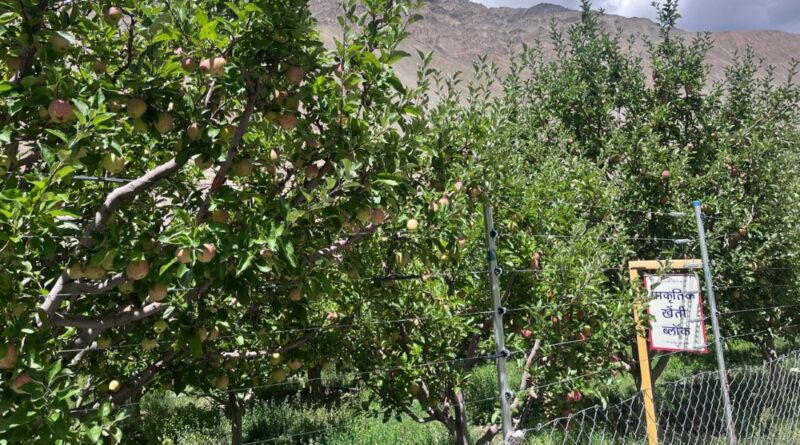KVK Tabo holds separate auction of Natural Farming apple orchard
Tabo, Lahaul & Spiti: In a pioneering move for Indian horticulture, apples produced entirely under natural farming methods have been auctioned separately for the first time. The apple orchard, belonging to Krishi Vigyan Kendra (KVK), Lahaul & Spiti-II at Tabo, under Dr. YS Parmar University of Horticulture and Forestry (UHF), Nauni, fetched an impressive ₹9 lakh during the auction of apple orchard on a 1100 m2 plot.
The orchard comprises 120 apple trees of different varieties, cultivated without the use of synthetic fertilizers or pesticides. Instead, natural inputs such as cow dung and cow urine-based inputs and locally available plant-based concoctions were used for soil fertility, pest and disease management.
Apples grown under Natural Farming practices in the Spiti Valley have demonstrated exceptional quality parameters. Cultivated without the use of chemical fertilizers and pesticides, the fruits recorded 13 % higher firmness than those from conventional orchards, indicating superior texture and longer shelf life. Additionally, the fruits exhibited a Total Soluble Solids (TSS) of 11 % higher than that of conventionally grown apples-a key indicator of natural sweetness and consumer preference. Further, the soil organic carbon of natural farming orchard was found to be 2.79%, which was higher than that in conventionally managed orchards (2.00%), indicating improvement in soil quality. Farmers adopting Natural Farming techniques report improved shelf life, enhanced taste and premium market prices compared to conventionally grown apples.
Dr. R.S. Spehia, Head KVK Tabo, shared that the kendra is funded by the ICAR-Agricultural Technology Application Research Institute (ATARI), Zone-I, Ludhiana, the KVK is administered by the Directorate of Extension Education of the university. He added that the orchard was converted to natural farming practices in 2020. He expressed gratitude to the university administration for its consistent guidance and support during this transition.
Providing further details, Dr. Inder Dev, Director of Extension Education, informed that the natural farming block at KVK Tabo currently holds a 2-star rating under the CETARA certification of the Government of Himachal Pradesh. Efforts are underway to achieve a 3-star rating. He expressed hope that this milestone will inspire more farmers to adopt natural farming and accelerate the National Mission on Natural Farming launched by the Government of India.
Congratulating the KVK team and the university’s extension wing, Vice-Chancellor Prof. Rajeshwar Singh Chandel said that UHF Nauni has been at the forefront of promoting natural farming across its research stations. He added that such initiatives would further strengthen the adoption of sustainable practices among the farming community of Spiti.
Prof. Chandel emphasized that the apples are tested annually for chemical residues at the NABL-accredited Residue Analysis Laboratory of the Department of Entomology at the university. “The results consistently confirm that the fruits are completely chemical-free,” he said.
Highlighting the ecological significance, Prof. Chandel noted that Spiti Valley has immense potential for natural farming as farmers already use minimal chemical inputs. “Adopting natural farming is vital to preserve the fragile soil and ecosystem of this cold desert region,” he said, adding that the Geu Panchayat of Spiti has already adopted natural farming for crop production.
The KVK is also working closely with farmers of this panchayat to make it a complete natural farming panchayat in Spiti Valley. A proposal to this effect has been submitted to the State Government. Once approved, the initiative will enable farmers to secure premium prices for their produce while promoting environmentally responsible agriculture in the high-altitude region.



